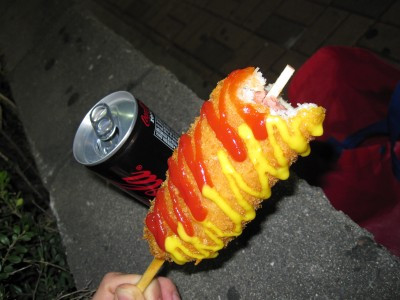
Street food is delicious and convenient, but less than healthy.However, what Korean junk food does typically have on its side is portion size, which is typically half the size of the same “serving” equivalence of a Western snack. For example, pop into the corner “Family Mart” for a can of Coke and you get a slim 250 mL containing 110 calories, instead of the chunky standard 330mL (12oz can) with 155 calories. Bottle sizes are smaller, too.
街頭小吃都很美味而且方便,但是不夠健康。但是,韓國(guó)的垃圾食品在提供份額上有典型特征——通常是西方甜食的一半。比如你走進(jìn)“全家”便利店里買(mǎi)一罐可樂(lè),你會(huì)發(fā)現(xiàn)這里提供的是110卡路里250ml的可樂(lè)而不是那種包裝短粗的含有155卡路里的330ml(每罐12盎司)的那種。瓶子也比較小。
Even some of their junk-food beverages make an attempt to include nutrition value! From aloe juice to "Milkis", a carbonated milk kids' favorite, smaller bottles mean even sweet beverages are toned down. “Pocari Sweat,” a popular drink despite its gag-worthy name, is full of antioxidants and ions that make this vitamin water a healthier alternative. Indeed, it’s one of the most prevalent student-consumed drinks I’ve seen. Now if only they could pair the sweet drinks with fluoride in the tap water. For all the health I'm claiming I still see way too many kids here with mouths of metal, and in Korea that doesn’t mean braces—it means silver fillings!
他們甚至試圖在一些高熱量的不健康飲料中加入一些營(yíng)養(yǎng)成分!從蘆薈果汁再到一種深受孩子喜愛(ài)的碳酸飲料牛奶——“牛奶蘇打水”。較小的瓶子甚至意味著糖份被降低了。"寶礦力水特"是一種很流行的飲料,除了那個(gè)讓人糾結(jié)的名字,它實(shí)際上還含有抗氧化成分和電解質(zhì),這使它成為維他命水中更健康的選擇。實(shí)際上,這是我所見(jiàn)過(guò)的最受學(xué)生歡迎的飲料之一。但愿他們能把這些甜甜的飲料和飲用水中的氟化物合理搭配。我說(shuō)的都是關(guān)于健康的。在這里我看到太多的孩子滿(mǎn)口金屬牙套,并且在韓國(guó)這不僅僅意味著對(duì)牙齒的一種支撐,它還意味著用銀粉填補(bǔ)牙齒!
As South Korea moves from a devastated rural concentration to a tech-savvy, academics-oriented society, it now increasingly faces the same health and nutrition problems as the United States and other countries. So far, it’s still managing to fit its skinny jeans. But as late-night academy hours continue and “American” fastfood lunches become more the norm than the specialty at elementary schools, (and now this kimchi shortage!) will those jeans continue to fit?
韓國(guó)從一個(gè)滿(mǎn)目瘡痍的鄉(xiāng)村集中的地方發(fā)展成一個(gè)科技嫻熟,以高科技為核心的社會(huì),現(xiàn)在,它逐漸與美國(guó)和其他國(guó)家一樣面對(duì)同樣的健康和營(yíng)養(yǎng)問(wèn)題。到現(xiàn)在為止,韓國(guó)仍然能夠“穿上”它那緊身的牛仔褲,但是隨著在深夜學(xué)習(xí)的情形的持續(xù),“美式”快餐與本地食物相比變得更加普遍和規(guī)范(并且現(xiàn)在泡菜短缺),這些牛仔褲還會(huì)合身嗎?
n. 汗,汗水
v. (使)出汗













